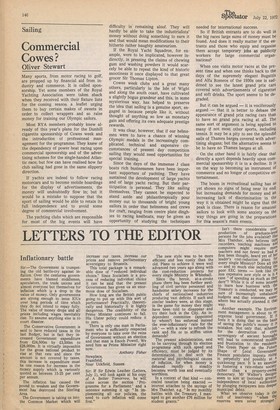Sailing
Commercial Cowes?
Oliver Stewart
Many sports, from motor racing to golf, are propped up by financial aid from industry and commerce. It is called sponsorship. Yet some members of the Royal Yachting Association were taken aback when they received with their fixture lists for the coming season a leaflet urging them to buy certain makes of sweets in order to collect wrappers and so raise money for training our Olympic sailors. Most RYA members probably knew already of this year's plans for the Dunhill cigarette sponsorship of Cowes week and the introduction of professional management for the programme. They knew of the dependency of power boat racing upon commercial sponsorship and of the advertising schemes for the single-handed Atlantic race; but few can have realised how far club sailing had gone in the same slippery direction.
If yachts are indeed to follow racing motorcars and to become mobile hoardings for the display of advertisements, the money will undoubtedly flow in; but it would be a mistake to suppose that the sport of sailing would be able to retain its full independence and to avoid some degree of commercial involvement.
The yachting clubs which are responsible for most of the big events will have difficulty in remaining aloof. They will hardly be able to take the industrialists' money without doing something to earn it and that would mean modifications to their hitherto rather haughty amateurism. If the Royal Yacht Squadron, for example, were to be implicated, however indirectly, in pressing the claims of chewing gum and washing powders it would scarcely be able to repeat the kind of historic snootiness it once displayed to that great grocer Sir Thomas Lipton. Cowes week clubs and a great many others, particularly in the Isle of Wight and along the south coast, have cultivated a slightly bogus grandeur and this, in some mysterious way, has helped to preserve the idea that sailing is a genuine sport, engaged in because people like it, without thought of anything so low as monetary gain and offering its own adequate prestige rewards. It was clear, however, that if our helmsmen were to have a chance of winning Olympic medals in the increasingly complicated, technical and expensive circumstances of present day competition sailing they would need opportunities for special training. Since the days of the immense J class boats rich businessmen have been important supporters of yachting. They have sustained the development of large yachts and of large yacht racing. But their participation is personal. They like sailing themselves. They cannot be expected to stand aside and philanthropically pour money out to thousands of bright young sailors in order that helmsmen and crews for craft, ranging from centre plate dinghies to racing keelboats, may be given an opportunity of studying the techniques So if British entrants are to do well in the big races large sums of money must be found. And does it really matter if the entrants and those who equip and organise them accept temporary jobs as publicity workers for large commercial organisations?
When one visits motor races at the present time and when one thinks back to the days of the supremely elegant Bugattis and Alfa Romeos of the 1930s one is saddened to see the latest grand prix cars covered with advertisements of cigarettes and soft drinks. The sport seems to be degraded.
But it can be argued — it is vociferously argued — that it is better to debase the appearance of grand prix racing cars than to have no grand prix racing at all. The same sort of argument is being applied to many if not most other sports, including tennis. It may be a pity to see the splendid sails of Thames barges covered with advertising slogans; but the alternative seems to be to have no Thames barges at all. On the other hand it is fairly clear that directly a sport depends heavily upon commercial sponsorship it is in a decline. It is on the way to becoming an instrument of commerce and no longer of competitive entertainment.
The boom in recreational sailing has as yet shown no signs of being near its end; but increasing demands for money and an increasing lack of discrimination in the way it is obtained might be signs that the peak is close. There is reason for amateur sailors to look with some anxiety on the way things are going in the preparations for this season's main events.










































 Previous page
Previous page